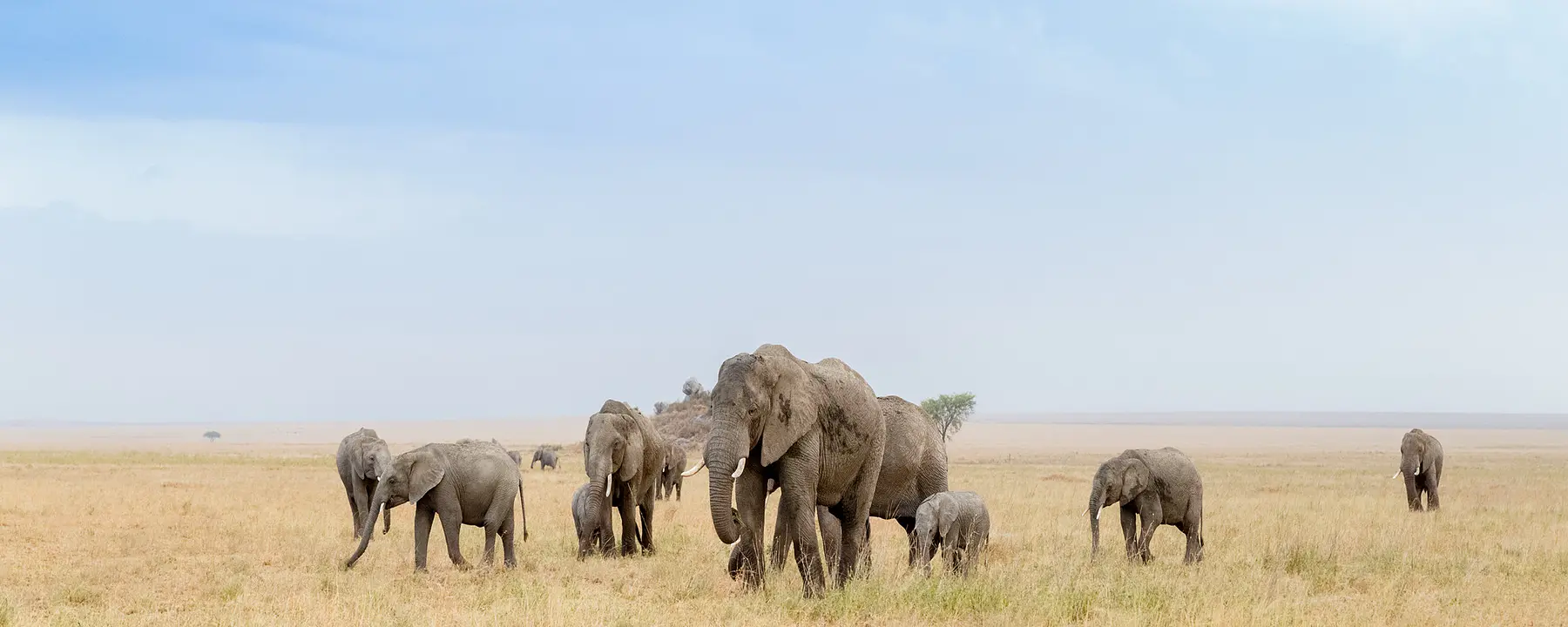Conservation of endangered species by tackling the illegal wildlife trade
The illegal trafficking of endangered animals and products such as elephant ivory, rhino horn, and pangolin scales continues to be prevalent and lucrative today, even in an era of global awareness about the decline of the planet’s wildlife. RTI is working to combat wildlife trafficking across the value chain from Africa to Asia, addressing both the supply and demand sides of the trade. Wildlife trade flourishes because communities can make a living by providing animals and animal products used in other parts of the world for everything from traditional medicine to home décor. RTI is strategically combating the illegal wildlife trade from both sides, through two complementary projects.
USAID PROTECT: Strengthening Capacity for Conservation and Wildlife Law Enforcement in Tanzania
In Tanzania, RTI implements the USAID Promoting Tanzania’s Environment, Conservation, and Tourism (PROTECT) activity to address the dynamics that threaten biodiversity and inhibit private sector–led ecotourism growth, including the trafficking of illegal wildlife products. The five-year USAID PROTECT activity focuses on strengthening institutions and building capacity so that Tanzanians can better protect their biodiversity. The goal is to stem the illegal killing and export of endangered animals, especially elephants, rhinoceroses, and lions, and products derived from them to Asia, thereby reducing the supply side of the trade.
One aspect of the activity is focused on combating wildlife crime and reducing the supply of wildlife products. We have taken a two-tiered approach to this strategy. The first tier is aimed at reducing poaching at the village level. The project supported the PAMS Foundation to conduct intelligence-based antipoaching trainings for village game scouts and wildlife rangers to increase their capacity to use data to catch poachers. USAID PROTECT also supported the Community Wildlife Management Areas Consortium and the Government of Tanzania’s Wildlife Division to provide intelligence training to key staff in community wildlife areas.
The second tier is focused on building capacity at higher levels along the law enforcement chain to improve the rate of successful prosecutions of wildlife traffickers. USAID PROTECT supported the African Wildlife Foundation to build capacity of Tanzanian dogs, working with skilled handlers, to sniff and detect ivory. The project also collaborated with the Tanzania Department of Public Prosecution, the Lawyers’ Environmental Action Team, and the United Nations Office on Drugs and Crime to develop protocols and train public prosecutors on prosecuting wildlife crimes. USAID PROTECT is currently working with TRAFFIC to train the Tanzania judiciary on judging wildlife crimes and to monitor the outcomes of court cases. At the same time, the project is supporting the OKOA Tembo wa Tanzania campaign, a grassroots social media campaign that raises awareness and advocates to parliament regarding the ivory trade.
By making people aware of the effects of wildlife trafficking, lobbying decision makers, and building capacity along the law enforcement chain from poaching sites to courtrooms, USAID PROTECT is working to reduce the illegal supply of endangered animals and products that are harvested and exported from Tanzania.
USAID Wildlife Asia: Tying Trafficking to Transnational Crime
In a region that includes Thailand, Cambodia, Laos, Vietnam, and China, RTI implements the USAID Wildlife Asia activity that focuses on reducing the demand for wildlife and products across Southeast Asia and China. A part of our USAID Wildlife Asia activity, we worked closely with the Association of Southeast Asian Nations to address wildlife trafficking as a transnational crime. In 2016, the United States passed the Eliminate, Neutralize and Disrupt Wildlife Trafficking Act. The bill requires the Secretary of State to identify countries serving as sources of illegal wildlife products and enables U.S. law enforcement to partner with agencies in Asia. Although the law is somewhat recent, USAID has been conducting conservation efforts in Asia for more than a decade.
Among the top items traded in Southeast Asia and China are elephant ivory, rhino horn, tiger skin and bones, and pangolin products. Transnational wildlife organized crime destroys both wildlife populations and wildlife-based livelihoods, generating social and political instability. Often, the organized crime network that participates in trafficking supports corruption and money laundering. Traffickers are also capable of spreading zoonotic diseases, which means that wildlife trafficking is both a conservation issue and a public health concern for many nations.
One aspect of combating wildlife trafficking is reducing consumer demand, which drives high prices and lucrative profits from wildlife trafficking and results in the drastic decline of animal populations. USAID Wildlife Asia launched a targeted behavior change campaign advocating ways to alter practices and build new social norms around wildlife practices based on formative research and proven social marketing and behavior change communication tools. In China, Thailand, and Vietnam, wildlife champions, business leaders, women, and youth help to amplify the message that conservation is needed.
Another goal of USAID Wildlife Asia is using trainings to strengthen the ability of regional law enforcement, including police, customs officers, and prosecutors, to locate, apprehend, and prosecute illegal wildlife traffickers. This effort supports improved sharing of intelligence on active investigations and collaboration for law enforcement in both Africa and Asia to help dismantle transcontinental trafficking syndicates.
Using Networking to Combat Illegal Wildlife Trafficking Rings
In 2017, we staged a conference of meetings in Bangkok, Thailand, called Innovations in Counter Wildlife Trafficking to unite and enable collaboration among leaders and stakeholders from countries involved in USAID PROTECT, USAID Wildlife Asia, and similar efforts. During this conference, policy makers, law enforcement, customs officials, and members of parliament discussed their respective countries’ challenges and successes and worked to improve communication channels. Additionally, we held media trainings to empower journalists to write about wildlife conservation and antipoaching efforts.
- U.S. Agency for International Development (USAID)/Regional Development Mission for Asia
- USAID/Tanzania






